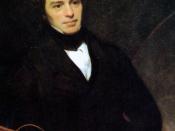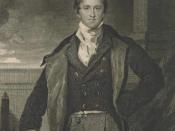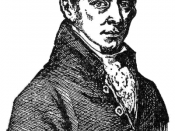Michael Faraday was born on September 22, 1791 in Newington, England. Faraday is known for his experiments in electricity and magnetism. Many say that he is the greatest experimentalist that ever lived. Faraday received little more than a primary education, and at the age of 14 he was apprenticed to a bookbinder. It was there where he became interested in the physical and chemical work. After hearing a lecture by the famous chemist Humphry Davy, he sent Davy the notes he had made of his lectures. As a result Faraday was appointed, at the age of 21, assistant to Davy in the laboratory of the Royal Institution in London. , Davy had been temporarily blinded by an explosion in his laboratory, and he needed help. He hired Faraday at once, beginning a close personal and professional relationship that lasted for years. However, Sir Humphry Davy soon became jealous of Faraday as the Royal Society tried to elect faraday into the fellowship, but Sir Humphry Davy objected.
The Royal Society also tried honoring Faraday for achieving the first liquefaction of chlorine, but Davy objected claiming that he himself deserved credit. Perhaps Davy had simply become envious of his former assistant. Faraday did finally become a member of the Royal Society in 1824.
During the first years of Faraday's career, he stuck strictly to chemical problems. He discovered two new chlorides of carbon and succeeded in liquefying chlorine and other gases. Sir Humphry Davy had great influence on Faraday's thinking, Faraday had been able to separate metal compounds with electric current, a process known as electrolysis. Faradays persistence in doing these experiments led in 1834 to what became known as Faraday's laws of electrolysis. Faraday believed that electricity is only one of the many forces of nature, which included heat, light, and...


